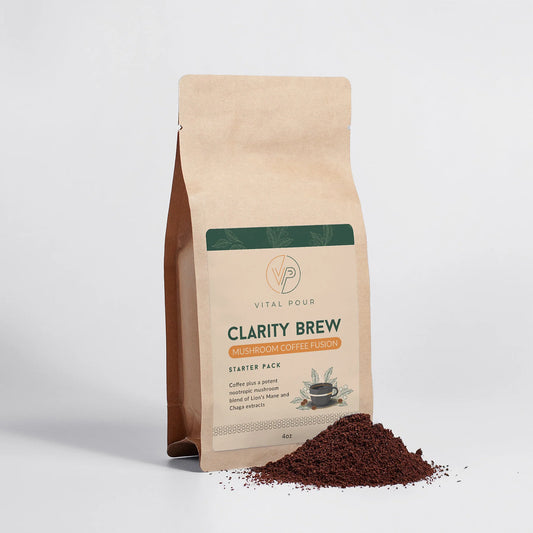The Rising Popularity of Reishi Mushrooms
Reishi mushrooms (Ganoderma lucidum), often referred to as the "king of mushrooms," have been a cornerstone of traditional Chinese medicine for centuries. Known for their remarkable ability to promote longevity and improve overall health, these mushrooms are now gaining widespread recognition in modern wellness communities. From supplements and powders to adaptogenic blends in coffee, reishi mushrooms are touted as a natural remedy for stress relief, immune support, and more.
In traditional Chinese medicine, reishi mushrooms are revered for their adaptogenic properties, which help the body manage stress and maintain balance. Modern science is beginning to validate these ancient claims, shedding light on the vast array of reishi mushroom benefits. Whether you're looking to support your immune system, reduce anxiety, or improve liver function, reishi mushrooms are increasingly seen as a versatile addition to any health routine.
Reishi mushroom products, such as reishi mushroom powder and reishi mushroom supplements, have become popular for their ease of use and concentrated health benefits. From brewing a calming tea to adding powdered reishi to smoothies, these products make it simple to incorporate the wellness benefits of reishi mushrooms into everyday life. As the demand for natural remedies grows, reishi mushrooms stand out as a powerful ally for those seeking balance and vitality.
Reishi Mushrooms and Liver Health: A Natural Ally
The Science Behind Reishi Mushrooms for Liver Toxicity Prevention
The liver plays a crucial role in detoxifying the body, and reishi mushrooms may provide significant support in maintaining its health. Research has shown that reishi mushrooms contain bioactive compounds, such as triterpenoids and polysaccharides, which exhibit hepatoprotective properties. These compounds help protect liver cells from damage caused by toxins, oxidative stress, and inflammation.

Studies cited by Healthline and WebMD indicate that reishi mushrooms may reduce markers of liver toxicity in individuals exposed to harmful substances. By promoting antioxidant activity, reishi mushrooms can mitigate the effects of free radicals, which are a common contributor to liver damage. This makes them an attractive option for individuals seeking natural ways to support liver health.
How Reishi Mushrooms May Help with Fatty Liver Conditions
Fatty liver disease, a condition characterized by excessive fat buildup in the liver, is becoming increasingly common due to poor diet and sedentary lifestyles. Emerging research suggests that reishi mushrooms for fatty liver may hold promise in addressing this issue. The triterpenoids in reishi mushrooms are believed to help regulate lipid metabolism, reducing fat accumulation in the liver.
Additionally, reishi mushrooms' anti-inflammatory properties can help alleviate liver inflammation, a key factor in the progression of fatty liver disease. While more clinical trials are needed, preliminary studies highlight reishi mushrooms as a potential natural remedy for improving liver function and preventing further damage.
By incorporating reishi mushroom powder or reishi mushroom supplements into your daily routine, you can take proactive steps toward better liver health. Whether you're managing an existing condition or looking to prevent liver issues, reishi mushrooms are a valuable addition to a balanced wellness plan.
Stress Relief and Anxiety: Adaptogenic Benefits of Reishi Mushrooms
What Makes Reishi Mushrooms a Powerful Adaptogen?
Reishi mushrooms are widely recognized as one of the most effective adaptogens, a class of natural substances that help the body adapt to physical, emotional, and environmental stress. The bioactive compounds in reishi mushrooms, particularly triterpenoids and polysaccharides, play a crucial role in balancing cortisol levels, the hormone responsible for stress response. By supporting the adrenal glands and reducing the impact of chronic stress, reishi mushrooms help promote a sense of calm and balance.

Unlike synthetic stress relievers, reishi mushrooms work holistically, targeting the root causes of stress rather than just masking the symptoms. This makes them an excellent option for individuals looking to manage their stress levels naturally and sustainably.
Evidence on Reishi Mushrooms for Reducing Anxiety and Promoting Relaxation
Scientific studies have shown that reishi mushrooms can help reduce symptoms of anxiety by modulating the central nervous system. A review of reishi’s adaptogenic properties found that its calming effects stem from its ability to regulate the production of neurotransmitters, such as serotonin and dopamine, which influence mood and relaxation.
For those experiencing persistent anxiety, incorporating reishi mushroom supplements or reishi mushroom powders into a daily wellness routine may provide significant relief. Reishi mushroom teas and coffees are also popular options, combining the soothing effects of the mushroom with the comforting ritual of a warm beverage.
Immune Support and Cancer Studies: What Research Says
Overview of Studies Showing Reishi Mushrooms’ Potential for Immune Modulation
One of the most well-documented benefits of reishi mushrooms is their ability to support and modulate the immune system. This is primarily attributed to beta-glucans, a type of polysaccharide found in reishi mushrooms, which enhance the activity of immune cells such as macrophages, natural killer cells, and T-cells. By strengthening the body’s natural defense mechanisms, reishi mushrooms help protect against infections and diseases.
Studies have demonstrated that reishi mushroom immune support is particularly beneficial for individuals with weakened immune systems, such as those recovering from illness or managing chronic conditions. Regular consumption of reishi mushrooms, either through reishi mushroom supplements or teas, can boost immunity and improve overall health.
Reishi Mushrooms and Cancer: What the Research Shows
Reishi mushrooms have also been studied for their potential role in cancer treatment and prevention. Preliminary research suggests that reishi’s bioactive compounds may inhibit the growth and spread of certain cancer cells. A reishi mushroom cancer study highlighted its ability to enhance the efficacy of conventional cancer therapies by improving immune function and reducing chemotherapy-related side effects like fatigue and nausea.
While reishi mushrooms are not a standalone treatment for cancer, they may serve as a complementary therapy to support the body during treatment. For example, studies have shown that patients who incorporated reishi supplements into their care plans experienced improved quality of life and reduced oxidative stress.
How to Incorporate Reishi Mushrooms for Immune Support
To enjoy the immune-boosting benefits of reishi mushrooms, consider adding them to your daily routine in the form of capsules, tinctures, or powdered blends. Many people also opt for reishi-infused coffees and teas, which offer a convenient and enjoyable way to support long-term immune health.
How to Use Reishi Mushrooms: Recipes, Coffee, and Supplements
Overview of Ways to Consume Reishi Mushrooms
Reishi mushrooms are highly versatile, making it easy to incorporate them into your daily routine. Popular forms include:
- Reishi Mushroom Powder: Ideal for blending into smoothies, teas, or baked goods.
- Reishi Mushroom Supplements: Capsules and pills provide a convenient and measured dose for consistent intake.
- Reishi Mushroom Coffee: A wellness trend combining adaptogenic benefits with the familiar comfort of coffee.
- Reishi Mushroom Tinctures: Liquid extracts, known for their potency, are perfect for adding to beverages or taking directly.
Each form has its unique benefits, allowing you to choose the method that fits your lifestyle and wellness goals.

Simple Recipes: Reishi Coffee and Tincture
-
Reishi Mushroom Coffee Recipe
- 1 tsp reishi mushroom powder
- 1 cup brewed coffee (regular or decaf)
- 1 tbsp unsweetened almond milk (optional)
- Sweetener to taste (optional)
- Brew your coffee as usual.
- Stir in the reishi mushroom powder until fully dissolved.
- Add almond milk and sweetener if desired.
- Enjoy your adaptogenic boost!
- Ingredients:
- Instructions:
-
Reishi Mushroom Tincture Recipe
- 1 cup dried reishi mushroom slices
- 2 cups vodka (at least 80 proof)
- 1 cup water
- Place the reishi slices in a glass jar and cover them with vodka.
- Seal the jar and let it sit for 4-6 weeks, shaking it occasionally.
- After this period, strain the vodka and set it aside.
- Simmer the reishi slices in water for about 1 hour, then strain the water.
- Combine the strained vodka and water extract in a clean jar.
- Store your tincture in a dark glass bottle and take as directed.
- Ingredients:
- Instructions:
Exploring Popular Brands and Blends
Reishi mushroom products are widely available, with popular options including coffee blends and supplements. For those seeking more comprehensive benefits, consider trying a 7-mushroom blend, which combines the power of reishi with other medicinal mushrooms like lion's mane and chaga.
Identifying and Foraging Reishi Mushrooms in the Wild
Identification Tips for Reishi Mushrooms
Foraging for reishi mushrooms in the wild can be an exciting and rewarding experience, but it's essential to know what to look for. Reishi mushrooms (Ganoderma lucidum or Ganoderma tsugae, depending on the region) are easily recognized by their distinctive fan-shaped appearance, glossy reddish-brown cap, and white to beige underside. They are often found growing on hardwood trees, such as oak or maple, and thrive in warm, humid climates.
When identifying reishi mushrooms in the wild, consider the following tips:
- Look for Location: Reishi mushrooms grow on decaying logs or the base of living trees. They’re more commonly found in forests with abundant moisture.
- Examine the Color and Texture: The cap of a reishi mushroom is shiny and lacquered, with a reddish-brown hue that fades to white or yellow around the edges.
- Check the Underside: Reishi mushrooms have a porous underside rather than gills, which helps distinguish them from toxic lookalikes.
Safe Foraging Practices
If you’re new to foraging, it’s crucial to follow safe practices:
- Always consult a reliable field guide or an expert mycologist to confirm your find.
- Avoid mushrooms growing in polluted areas, as they can absorb toxins from their environment.
- Harvest sustainably by leaving part of the mushroom intact to allow regrowth.
Wild Reishi vs. Store-Bought Powders and Supplements

While foraging for reishi mushrooms in the wild is a fulfilling way to connect with nature, many people prefer the convenience of store-bought powders and supplements. Wild reishi may contain variations in potency depending on growing conditions, whereas commercially produced powders and supplements are often standardized for consistency. Both options can provide health benefits, so the choice depends on your lifestyle and preferences.
Safety and Side Effects: What to Know Before Using Reishi Mushrooms
Safety Considerations for Pregnancy
While reishi mushrooms are generally considered safe for most people, their use during pregnancy is less well-studied. Pregnant individuals should approach reishi mushroom supplements with caution, as there is limited evidence about their safety during this time. Some traditional practices discourage the use of adaptogens during pregnancy due to their potential effects on hormonal balance and the developing fetus.
It’s always best to consult a healthcare professional before using reishi mushrooms during pregnancy, particularly in supplement or tincture form.
Potential Risks Like Liver Toxicity
Despite their many benefits, reishi mushrooms may pose risks if consumed in excess. Some studies have noted that high doses of reishi mushroom extract could lead to adverse effects, including liver toxicity in rare cases. It’s essential to follow recommended dosages and avoid overconsumption, particularly when using concentrated extracts.
Possible Side Effects and Who Should Avoid Reishi Mushrooms
Although reishi mushrooms are well-tolerated by most people, some may experience side effects, such as:
- Digestive issues, including nausea or diarrhea.
- Allergic reactions, particularly for individuals sensitive to fungi.
- Low blood pressure, due to reishi’s potential to reduce blood pressure levels.
People taking blood-thinning medications, those with autoimmune disorders, or individuals undergoing surgery should consult their doctor before adding reishi mushrooms to their routine.
Conclusion: Should You Add Reishi Mushrooms to Your Wellness Routine?
Reishi mushrooms are more than just a health trend—they’re a powerhouse of natural wellness benefits backed by centuries of traditional use and emerging scientific research. From supporting liver health and reducing anxiety to boosting immunity and promoting radiant skin, reishi mushrooms offer a versatile solution for various health concerns.
Incorporating reishi mushroom supplements or powders into your routine is a simple way to harness their benefits, but it’s important to do so mindfully. As with any supplement, consult your healthcare provider to ensure they are safe and appropriate for your specific needs.
Whether you’re sipping on reishi mushroom coffee, foraging for reishi mushrooms in the wild, or taking capsules as part of your wellness regimen, reishi mushrooms are a powerful ally in achieving balance, vitality, and overall health.


